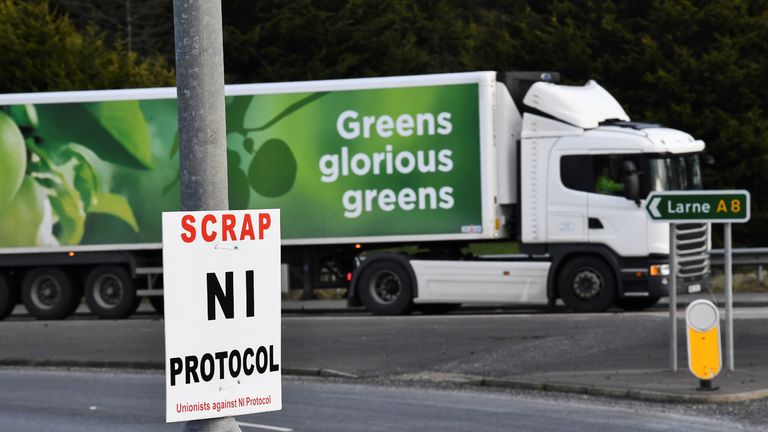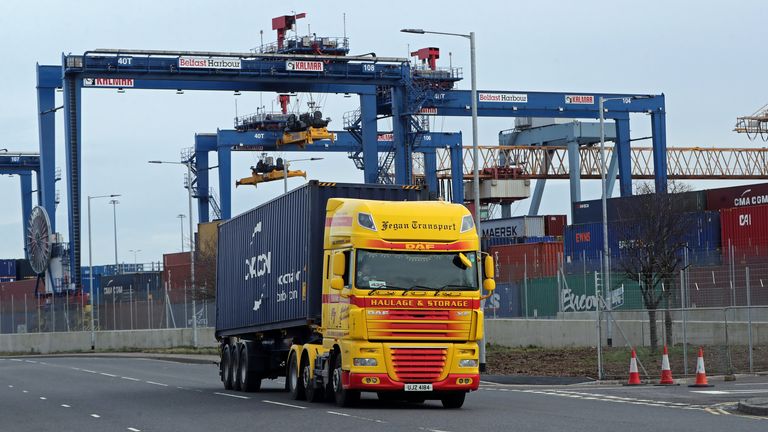The Brexit minister said the UK and the EU «cannot go as we are» with the current Northern Ireland Protocol arrangements.
Lord Frost told the House of Lords that ‘Big changes’ were needed And that new proposals It will bring a «new balance» to the mechanism.
He said post-Brexit trade checks between Northern Ireland and Great Britain had been «a source of significant and ongoing disruption», blocking the passage of goods such as meat, medicine and animals.
But Northern Ireland Minister Brandon Lewis said the proposals would not go so far as to invoke Article 16, which enables the UK or the EU to unilaterally suspend part of the arrangements.
European Commission Vice President Maros Sefcovic said the EU was open to «creative solutions» but would not renegotiate the protocol.
What is the Northern Ireland Protocol?
The United Kingdom and the European Union have agreed to put the protocol into effect after Brexit to avoid imposing a hard border between Ireland and Northern Ireland.
It states that Northern Ireland will remain part of the UK’s customs territory – so if the UK signs a free trade agreement with another country, Northern Ireland goods will be included.
However, Northern Ireland will have to adhere to some EU rules to allow goods to move freely into the republic.
Goods transported from the rest of the UK into Northern Ireland will only be subject to tariffs if they are «at risk» of being transferred to the EU afterwards.
But Environment Minister George Eustice said in 2020 that «some checks on some goods» and «some customs procedures but not customs inspections» would be needed at the border with the republic.
What is Article 16?
Article 16 is a clause to be used when the Protocol leads to “serious economic, social or environmental difficulties that could persist or divert trade.”
The UK or EU are allowed to act unilaterally to avoid such difficulties.
Article invocation of last resort is when the parties cannot agree on a common approach to solving problems.
What has happened since the end of the Brexit transition period?
Products from Great Britain entering Northern Ireland had to go through EU import procedures at the ports.
A border on the Irish Sea was effectively enforced in an attempt to prevent a physical border between Ireland and Northern Ireland.
This resulted in delays and sometimes scattered shelves in the supermarket.
Lord Frost told the House of Lords on 21 July that this meant some product lines in the stores would be reduced.
He said that «more than 200 suppliers» had decided to stop selling to Northern Ireland, and that there were also issues with «medicines, pets, live animal movements, seeds, plants, and many more».
What are the differences between the UK and the EU?
Under the protocol, a ban would be imposed if the UK and EU could not agree on new regulatory standards on some products after a number of «grace periods» had expired.
In March, the UK unilaterally extended the period for supermarket goods and parcels for another six months – prompting legal action from the European Union.
The grace period for refrigerated meat products – such as sausages – was extended at the end of June after the European Union and the United Kingdom agreed to bring them back to September 30.
As it stands, refrigerated meat from Great Britain will not be allowed to be sold in Northern Ireland after this date because it is not from the European Union – which has its own stringent standards for food products.
Lord Frost said on July 21 that the UK’s proposals to change the protocol included a «downtime» where existing grace periods would be kept, as well as a «freeze of existing legal procedures and processes».
«This is to ensure there is room for negotiation and to provide a real signal of goodwill to find ways forward,» he said.
The European Union said the UK could align with its own animal health and food safety rules to remove the need for 80% of the current customs checks of the Irish Sea.
But the UK refused, saying it would restrict Britain in trade negotiations with other countries.
The UK has also accused the EU of failing to deal with its own proposals, particularly with regard to the issues faced by people in Northern Ireland.

«Lector profesional. Jugador galardonado. Aficionado a los zombis. Adicto a las redes sociales. Experto en tocino. Erudito en Internet»


